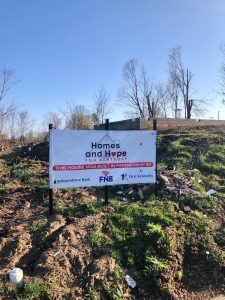 On December 10, 2021, a devastating tornado hit Mayfield, KY and left an everlasting impact on our community. While the tornado was catastrophic, many good things have come out of the rubble such as organizations like Homes and Hope for Kentucky.
On December 10, 2021, a devastating tornado hit Mayfield, KY and left an everlasting impact on our community. While the tornado was catastrophic, many good things have come out of the rubble such as organizations like Homes and Hope for Kentucky.
The focus of the Homes and Hope organization is to assist in the long-term disaster recovery of Mayfield and Graves County by rebuilding homes for those that had little or no insurance and fall below the average median income for the area. Its ultimate mission is to give families new hope in the community.
Many groups and individuals have collaborated with Homes and Hope to assist in its initiative through the donation of labor, skills, time, material, and money. The Homes and Hope mission is ongoing and requires continuous funding to allow the organization to purchase building materials and pay construction costs for each home built. The labor is provided by volunteer organizations, including ACTS, an Amish organization from Indiana and Christian Public Services.
Three local banks, First Kentucky Bank, Independence Bank, and FNB Bank, have all stepped up to help. They will combine their monetary resources, along with funds from the Mayfield Graves Tornado Relief Fund, to provide financing for a new house, which will benefit a local family that was directly impacted by the December 10th tornado.
The Mayfield Graves Tornado Relief Fund was established from the numerous donations that flooded in from all over the country to help with our community’s relief efforts. This organization is designating $30,000 towards the rebuild of a home.
First Kentucky, Independence, and FNB, will help further that donation by matching the $30,000. Each bank will make an individual donation of $10,000. The donations will be given to Homes and Hope for KY and will cover a portion of the funds necessary to build a new house, which is approximately $104,000 in total.
Homeowners also contribute towards the cost if they are able and typically include a portion of the FEMA or insurance payments they received. In addition, the Federal Home Loan Bank of Cincinnati provides a grant of up to $20,000 per home that helps offset the cost of building.
“One thing we all have in common is a love for this community and the desire to help rebuild it. We all want to see Mayfield thrive again, and we know that will take a collaborative effort. We have wonderful partners from our community, as we see today with our local banks, and from farther away. We could not bring this hope to families without the partnership of volunteer organizations like Mennonite Disaster Services which is the lead on this project. We appreciate all those that continue to support our efforts financially and believe in our community. Being able to help a family have a home again is a great honor and a step in the right direction to making Mayfield whole again,” expressed Heather Nesler, Homes and Hope Board Co-Chair.
To apply for a home, donate, or learn more, please visit homesandhopeforky.com, email homesandhopeforky@gmail.com, or call 270-540-7070.
To learn more about the Mayfield Graves Tornado Relief fund, visit mayfieldgravesstrong.org. Donations and requests for assistance can also be made through their site.
About FNB Bank, Inc.
FNB Bank, founded in 1875, is one of the oldest banks in the state of Kentucky with assets exceeding 650 million. FNB ranks among the highest in the nation in the area of safety and soundness. FNB is a 2021 and 2022 ‘Best Places to Work in Kentucky’ Small Business Category Award Winner. The bank currently has nine locations located in Graves, McCracken, Calloway and Trigg County, with another office coming soon in 2022 in Marshall County. FNB is member FDIC and an Equal Housing Lender.
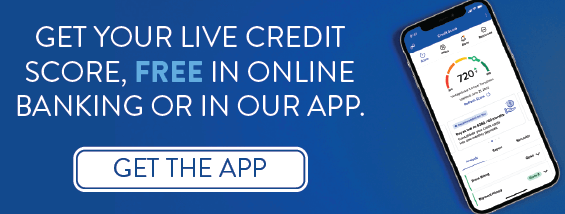


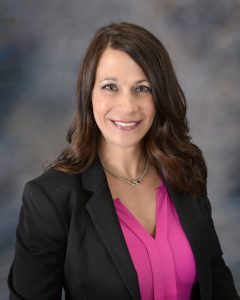 Annie has 24 years of banking experience and currently serves as a Mortgage Loan Officer for FNB. Annie is a 1996 graduate of Graves County High School. She currently serves on the Graves County Board of Realtors and has previously been involved with the Graves County High School Mentoring Program. She currently resides in Sedalia with her fiancé, Jamison. Annie has three children: Bailey, Bryce and Jett.
Annie has 24 years of banking experience and currently serves as a Mortgage Loan Officer for FNB. Annie is a 1996 graduate of Graves County High School. She currently serves on the Graves County Board of Realtors and has previously been involved with the Graves County High School Mentoring Program. She currently resides in Sedalia with her fiancé, Jamison. Annie has three children: Bailey, Bryce and Jett.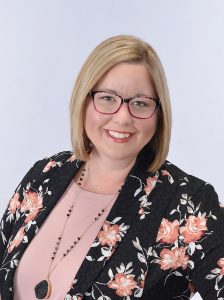 Beth Hood has 7 years of banking experience and currently serves as a Mortgage Loan Officer for FNB. Beth is a 2002 graduate of Graves County High School and a 2012 graduate of Mid-Continent University, where she obtained a bachelor’s degree in Business Management. Beth is a graduate of the Paducah Chamber Leadership Class #35. She resides in Mayfield with her husband, John, and their two children, Lilly and Ella.
Beth Hood has 7 years of banking experience and currently serves as a Mortgage Loan Officer for FNB. Beth is a 2002 graduate of Graves County High School and a 2012 graduate of Mid-Continent University, where she obtained a bachelor’s degree in Business Management. Beth is a graduate of the Paducah Chamber Leadership Class #35. She resides in Mayfield with her husband, John, and their two children, Lilly and Ella.
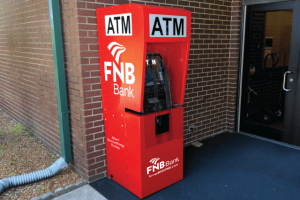 FNB is happy to announce the addition of a new walk-up ATM at the WK&T Technology Park, located at 100 WK&T Technology Drive, Building 300 (near the gazebo between WK&T and FNB’s administrative office buildings). The ATM is a cash disbursing only machine and FNB customers will not incur any transaction charges to use the machine with their FNB debit cards.
FNB is happy to announce the addition of a new walk-up ATM at the WK&T Technology Park, located at 100 WK&T Technology Drive, Building 300 (near the gazebo between WK&T and FNB’s administrative office buildings). The ATM is a cash disbursing only machine and FNB customers will not incur any transaction charges to use the machine with their FNB debit cards.

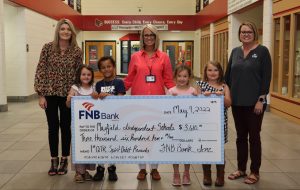 FNB Bank is proud to announce that they have donated over $9,000 back to Mayfield and Graves County Schools through their Spirit Debit Card Program. These donations to the school systems are a result of FNB’s 1st quarter 2022 Spirit Debit Card Reward Program.
FNB Bank is proud to announce that they have donated over $9,000 back to Mayfield and Graves County Schools through their Spirit Debit Card Program. These donations to the school systems are a result of FNB’s 1st quarter 2022 Spirit Debit Card Reward Program.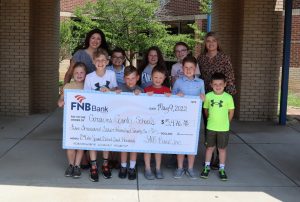 The FNB Spirit Debit Card Rewards Program allows FNB and their customers the opportunity to give back to their local schools when they use their FNB debit card. FNB currently offers Spirit Debit Cards for Mayfield, Graves County and Trigg County Schools. The Spirit Card works like a traditional debit card and for each signature-based transaction (not using your PIN), FNB donates $0.10 to the corresponding school. The tracking process is hassle free for the card holder, as FNB does all the tracking and submits the check to each school on a quarterly basis. The donated funds are utilized at the school’s discretion.
The FNB Spirit Debit Card Rewards Program allows FNB and their customers the opportunity to give back to their local schools when they use their FNB debit card. FNB currently offers Spirit Debit Cards for Mayfield, Graves County and Trigg County Schools. The Spirit Card works like a traditional debit card and for each signature-based transaction (not using your PIN), FNB donates $0.10 to the corresponding school. The tracking process is hassle free for the card holder, as FNB does all the tracking and submits the check to each school on a quarterly basis. The donated funds are utilized at the school’s discretion.



 On December 10, 2021, a devastating tornado hit Mayfield, KY and left an everlasting impact on our community. While the tornado was catastrophic, many good things have come out of the rubble such as organizations like Homes and Hope for Kentucky.
On December 10, 2021, a devastating tornado hit Mayfield, KY and left an everlasting impact on our community. While the tornado was catastrophic, many good things have come out of the rubble such as organizations like Homes and Hope for Kentucky.